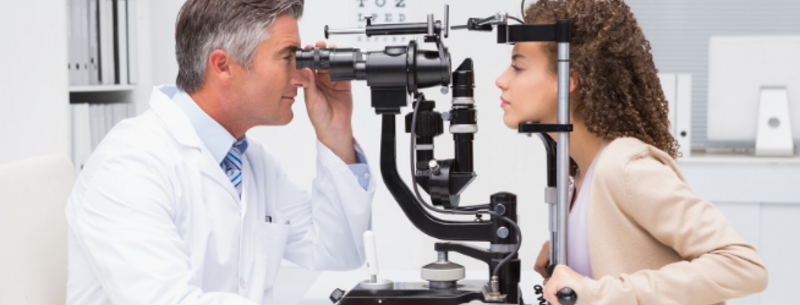
Eye exams or eye tests are comprehensive examinations of your eye health and vision, performed by your optometrist. It is recommended that adults have their eyes examined, whether vision correction is needed or not, every two years unless advised otherwise.
Regular eye tests ensure that your eyes stay healthy and any issues are spotted as soon as possible, even without obvious symptoms like rapid vision changes or eye pain.
In the UK, your visual perception is also tested during an eye exam, which is why they may also be referred to as sight tests. Your optometrist checks your visual acuity, performs a refraction to find out if you require glasses, contact lenses, or if your prescription has changed, as well as assessesthe health of your eyes.
Can I check my eyesight at home?
Although online vision tests promise to offer results without a trip to the optometrist, they are no substitute for a professional sight test. You may confirm your visual accuracy to some extent, but it won’t be able to provide any information about the condition of your eye health.

Why are regular eye tests important?
Eyesight is one of the most important senses and therefore looking after your eye health has a high priority. During an eye test, your optometrist checks your visual perception and eye health but may also notice other changes as signs for possible health conditions affecting other parts of your body.
Even if you don’t notice any changes in your vision or eye health, regular eye tests ensure that no conditions go unnoticed, despite the lack of apparent symptoms.
Early detection of eye conditions
Eye tests can detect early progression of eye conditions that are genetically passed on through generations, as well as refractive errors like short or long-sightedness and astigmatism. These detections can be vital in preventing vision loss.
Refractive error
Refractive errors, such as short or long-sightedness and astigmatism, often develop early in life. Therefore, if left uncorrected, it typically affects the learning abilities of young children as well as the natural development of their eyes.
Adults who develop a refractive error without realising tend to notice headaches and regular squinting to improve their vision.
Eye diseases
During eye exams, optometrists can detect early signs of eye diseases such asglaucoma, cataracts or age-related macular degeneration. These conditions can lead to irreparable vision loss if left untreated; therefore, it is important to spot them as soon as possible.
Other health conditions
Through the eyes, optometrists can assess the behaviour of blood vessels and certain cells that move through the body. If they notice something that doesn’t look right, they will be able to refer you to a specialist, as the abnormalities may be signs of heart disease, high blood pressure, diabetes or other health problems.
Heart conditions
Heart diseases, such as atherosclerosis, can cause build-up in your blood vessels, which may affect your vision. If you notice any changes in your sight, from reduced vision to visual disturbances, mention it to your optometrist as soon as possible.
Diabetes
Changes to the back of the eye in the form of yellow deposits and bleeding on the retina can be detected by your optometrists and may possibly be signs of diabetic retinopathy. Regular eye exams can help detect these at an early stage and avoid vision loss.
How do I know if I need an eye test?
It is recommended to schedule an eye exam every two years, but you can contact your optometrist as soon as you notice any vision changes or if you experience sudden pain and irritation.
What happens during an eye exam?
An eye exam includes several tests to confirm the health of your eyes. The optometrist examines both internal and external areas of your eyes and discusses any symptoms, abnormalities and eye health risks that may run in your family with you.
Types of checks
In the UK, optometrists typically perform the following tests to ensure your eye health is in good condition.
Pre-screening
During the pre-screening of an eye exam, the optometrist or optical assistant tests the pressure of your eyes and takes photos of the back of your eyes (the retina) to check for irregularities. Auto refraction and focimetry are used to check your prescription and measure your current glasses. A visual fields assessment may also be performed if required.
The eye exam
Your optometrist confirms your medical history before checking your vision, the muscles in your eyes and performing a refraction. This allows them to determine or refine your prescription.
An eye health examination is performed with the help of a slit lamp, which is an illuminating microscope and allows the optometrist to examine the internal and external structures of your eyes.
Additional tests
Further, the optometrist performs any additional examinations based on your medical history or if you are reporting any changes in your vision.

How frequently should you schedule an eye test?
Our eyes constantly change, and regardless of age, the regularity with which you should have an eye exam depends on your eye health and whether you have any other medical conditions.
Young children
Although young children can have their eyes tested by paediatric optometrists, high-street optometrists will also examine the eyes of children.
School children
School children are recommended to have annual eye exams, as their eyes change more rapidly due to daily visual activities at school and constant body growth.
Adults
Healthy adults with no other medical or eye conditions are recommended to have their eyes checked every two years.
Over the age of 60
Those above the age of 60 are recommended to have their eyes tested every two years. However, ageing eyes are more perceptive to eye conditions and therefore, annual eye exams may be recommended by the optometrist — if required.
How much does an eye test cost?
In the UK, the costs for eye tests vary per optician’s practice. Generally, the price can be expected to be between £20-£35, depending on how comprehensive the examination is.
Who is eligible for free eye tests?
The NHS offers free eye tests to everyone under the age of 16 or up to the age of 18 for those in full-time education. You will also be eligible for free eye tests over the age of 60.
They also offer free eye tests to patients that are visually impaired or at higher risk of vision loss, such as those with a family history of glaucoma.
Free eye tests will also be offered to those on benefits, such as income support, income-related employment and support allowance or jobseeker’s allowance, pension credit or universal credit.